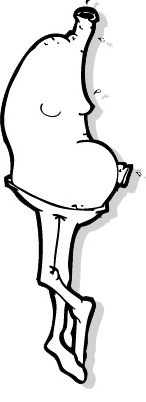Our Daily Meat: IHT Op-Ed Muses on Money and Meat and Fetishism
Tuesday, 23 September 2008 by Dr Maytel
A man walked into the Ritz Bar. The bartender said, "I heard that you lost a lot in the crash." The man replied, "I did. But I lost everything I wanted in the boom." This exchange, from F. Scott Fitzgerald's "Babylon Revisited," a story set early in the Depression, suggests how a time of economic crisis can provoke a reckoning with what matters most.
That is not glibly to say, in the manner of a moralizing preacher, that concern with money is trivial, or that worry tied to last week's financial jolts is only greed. Job loss, pension insecurity, threat of foreclosure, the squeeze of debt, rising cost of living - if these problems are not properly a source of anxiety, nothing is.
But what is money? There is a clue in the reference in Fitzgerald's title. Babylon, the ancient Mesopotamian city on the Euphrates River, lives in memory as a place of license and sensuality. If captive in Babylon, it is important to maintain a spirit of detachment from its excesses. That's the Biblical reference.
But in the mists of time, predating the Bible, civilization was itself born in the alluvial plain between the Tigris and the Euphrates. That occurred when nomads - hunters, gatherers, herders - settled in cities that were built around agriculture. One of the main innovations of the settled life based on farming was the capacity to accumulate more than was needed to live. This surplus was both a boon - it enhanced survival - and a curse - it led to the organized thievery of social class. The management of surplus became a valued skill, the idea of wealth was born, and, even allowing for inequity, the human species made its great evolutionary leap.
But money predates agriculture. Anthropologists speculate that the first form of currency - a symbol whose value is imputed rather than inherent - were the pieces of flesh that hunters tore from a vanquished beast. It was not only that successful hunters could then eat to live, but that they could take morsels of meat back to their social circles, however defined. The meat had value in itself, but soon enough it took on transcendent worth.
Indeed, the tearing of flesh from the bones of the killed animal became ritualized, a possible origin of religious sacrifice. A kind of divinity was attributed to the victim, which, after all, was now the source of sustenance, and vestiges of the victim's body were now considered to be holy.
The torn meat became something to exchange, a way to accommodate new divisions of labor, compensating those whose contributions to community survival was less direct than joining in the hunt. A sacred aura hung over the whole enterprise, which may have made it work. The bull as a symbol of the stock market, a contemporary sacred cow, is thought to be rooted in this ancient phenomenon. (The historian Dennis King Keenan suggests that the Latin word pecunia comes from pecus, meaning cattle. The English word "money" comes from the Roman goddess Juno Moneta, in whose temple bulls were sacrificed.) Money's subliminal connection to divinity is enshrined even in the way communion wafers of the Christian liturgy are shaped like coins. A sacrament exists to point beyond itself to something sacred. It is not too much to say that the first sacrament was money.
Meat as a form of currency makes the meaning of money clear. Nutrition is what humans need to live. Stored nutrition, managed by a system of credit, is what humans need to live without obsessing about the next meal. All that we associate with civilization followed from that freedom - from writing to art to concern with consciousness itself. Civilization erected walls to protect against the contingency of existence on a dangerous planet, and the chief emblem of that protection is money.
Because direct awareness of normal human vulnerability - the beasts are still out there - is so frighteningly immobilizing, it became normal to think that what protects us is absolutely trustworthy. That is why primitive humans began to explicitly regard their money as divine, and it is why, equally, if less explicitly, we do, too.
But, in fact, the money is not what protects us. Nor do the gods. Human inventiveness is our protection, and that remains firmly on display.
Link
Aaaahhhhhh, somehow anthropological musings on the current global finance calamity makes it all seem so much more manageable. Anthropologists love to stress that so many of the challenges faced by humanity are in fact human constructed, yet we fetishize them as if they were beyond our control. If only we would wake up and see that the only limits are the collective ones we place upon ourselves they seem to taunt. And while this is to some degree true, understanding that meat is the pre-modern money and it is all linked to social status within tribes and groups, and that is what gives it it's power, does little to allay my fears that our savings may not be safe and that the US dollar is likely to collapse
